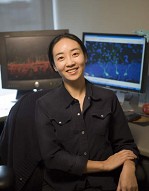Recent technological developments have ushered in a new era for the medical research field based on our ability to generate stem cells (called induced pluripotent stem cells or iPSCs) out of adult patient cells, such as blood or skin fibroblasts. There are two important benefits of this technology relevant for research into Prader Willi Syndrome (PWS): 1) the newly generated stem cells retain all of the genetic information from the donor; and 2) these stem cells can be made to differentiate into any cell types, including neural cells. For neurological disorders with complex genetics, these two properties are particularly salient. We propose to generate iPSCs from four PWS patients with type I and type II deletions of paternally expressed genes in the 15q11.2-13 region. We will then differentiate these cells into human cortical neurons to investigate cellular and molecular mechanisms that contribute to disturbances in brain development that lead to PWS. Studies such as these are a much-needed complementary approach to animal models and patient studies. Importantly, we will be investigating disease-relevant human cells, with the same genetic disruption in the 15q11.2-q13 region as patients, in a controlled cellular model that is amenable to targeted manipulation of specific genes and processes. Results of this work could enable improved diagnostic classification and lay the groundwork for future drug screens to identify new therapeutic compounds.
Research Outcomes: Project Summary
In this project, we generated induced pluripotent stem cells (iPSCs) from two Prader-Willi Syndrome (PWS) patients as a disease model to explore the neural pathogenesis of Prader-Willi syndrome (PWS). Patient-derived iPSCs were generated with a non-integrating method using classic reprogramming factors. PWS-iPSCs displayed typical morphology that was indistinguishable from control iPSCs derived from unaffected individuals. We validated the induction of the PWS patient-specific iPSC lines via the expression of transcription factors associated with pluripotency and stem cell markers. Directed differentiation of iPSCs to a neural fate is critical to examine the progression of complex neurological disorders through a series of developmental stages. For this initial study, these PWS patient-specific iPSC lines were coaxed into the neuroectodermal lineage and further differentiated into cortical glutamatergic neurons. Our preliminary results suggest potential developmental differences in the glutamatergic neurons derived from PWS patients, which could have an effect on neuronal function. Our fully validated PWS patient-specific iPSC lines provide an important resource for the scientific community that can be used to perform systematic investigations of the development of many neuronal cell types that are relevant to PWS.
Research Outcomes: Publications
Generation of hypothalamic arcuate organoids from human induced pluripotent stem cells. Huang W-K, Wong SZH, Pather SR, Nguyen PTT, Zhang F, Zhang DY, Zhang Z, Lu L, Fang W, Chen L, Fernandes A, Su Y, Song H, Ming G. Cell Stem Cell, 2021, ISSN 1934-5909.
Using brain organoids to understand Zika virus-induced microcephaly. Qian X, Nguyen HN, Jacob F, Song H, Ming GL. Development, 2017 Mar 15;144(6):952-957.
Funded Year:
2015
Awarded to:
Guo-Li Ming, MD, PhD
Amount:
$108,000
Institution:
Johns Hopkins University
Researcher:





